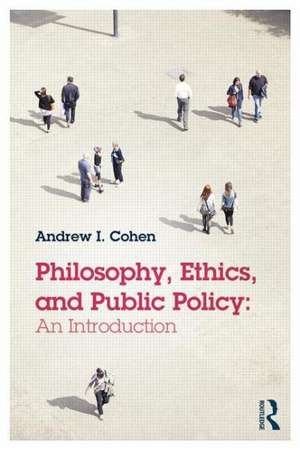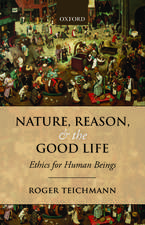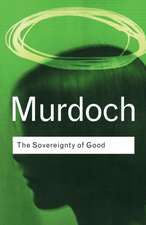Philosophy, Ethics, and Public Policy: An Introduction
Autor Andrew Cohenen Limba Engleză Paperback – 9 sep 2014
- public policy and globalization: sweatshops; medicine and the developing world; immigration
- marriage, family and education: same-sex marriage; women and the family; education and Intelligent Design
- justifying and responding to state coercion: torture; reparations and restorative justice
- the ethics of the body and commodification: the human organ trade, and factory farming of animals.
| Toate formatele și edițiile | Preț | Express |
|---|---|---|
| Paperback (1) | 411.64 lei 6-8 săpt. | |
| Taylor & Francis – 9 sep 2014 | 411.64 lei 6-8 săpt. | |
| Hardback (1) | 1220.31 lei 6-8 săpt. | |
| Taylor & Francis – 18 sep 2014 | 1220.31 lei 6-8 săpt. |
Preț: 411.64 lei
Nou
Puncte Express: 617
Preț estimativ în valută:
78.78€ • 81.94$ • 65.04£
78.78€ • 81.94$ • 65.04£
Carte tipărită la comandă
Livrare economică 14-28 aprilie
Preluare comenzi: 021 569.72.76
Specificații
ISBN-13: 9780415814171
ISBN-10: 0415814170
Pagini: 240
Ilustrații: black & white illustrations
Dimensiuni: 156 x 234 x 13 mm
Greutate: 0.35 kg
Ediția:New.
Editura: Taylor & Francis
Colecția Routledge
Locul publicării:Oxford, United Kingdom
ISBN-10: 0415814170
Pagini: 240
Ilustrații: black & white illustrations
Dimensiuni: 156 x 234 x 13 mm
Greutate: 0.35 kg
Ediția:New.
Editura: Taylor & Francis
Colecția Routledge
Locul publicării:Oxford, United Kingdom
Public țintă
Postgraduate and UndergraduateCuprins
Introduction 1. Sweatshops 2. Pharmaceuticals and the developing world 3. Immigration 4. Same-sex marriage 5. Women and the family 6. Education and intelligent design 7. Torture 8. Reparations and restorative Justice 9. Markets in human body parts 10. Factory farming of animals 11. Conclusion. Index
Recenzii
"... Every chapter is clearly written, gives a balanced discussion, and has copious notes. Further reading suggestions and a good index make this a valuable resource. Summing Up: Recommended." - D. Stewart, CHOICE
"Cohen’s book provides an excellent introduction to the field of ethics and public policy. In examining an array of cutting-edge policy controversies, Cohen deftly integrates moral concerns with political and economic considerations. In doing so, he shows how moral reasoning contributes its own distinct repertoire of analytical tools to policymaking, a repertoire every bit as rich and indispensable as those offered by economics and political science." - Andrew Stark, University of Toronto, Canada
"This book is a model for how to write clearly and think deeply about the connection between ethics and public policy. I wouldn’t hesitate to assign it for an undergraduate course, or recommend it to anyone interested in thinking through the moral trade-offs and feasible policy responses to some of the most important and topical challenges of our time." - Jonathan Anomaly, Duke University, USA
"Cohen's wonderful book begins with an obvious question that almost nobody ever asks: why have any policy at all? Asking this question opens our eyes to the possibility that sometimes the best public policy is no public policy. With admirable sensitivity to the constraints that economic and political realities impose upon our philosophical ideals, Cohen shows us just how difficult this default option can be to overcome." - Matt Zwolinski, University of San Diego, USA
"Cohen is the perfect author to explore the controversial matters addressed in this important book. He is exceptionally insightful and clear-headed, and writes with admirable clarity and rigor. I would recommend this excellent book to anyone who wants to think openly and critically about the most pressing public policy issues of our time." - Christopher Heath Wellman, Washington University in St. Louis, USA
"Cohen’s book provides an excellent introduction to the field of ethics and public policy. In examining an array of cutting-edge policy controversies, Cohen deftly integrates moral concerns with political and economic considerations. In doing so, he shows how moral reasoning contributes its own distinct repertoire of analytical tools to policymaking, a repertoire every bit as rich and indispensable as those offered by economics and political science." - Andrew Stark, University of Toronto, Canada
"This book is a model for how to write clearly and think deeply about the connection between ethics and public policy. I wouldn’t hesitate to assign it for an undergraduate course, or recommend it to anyone interested in thinking through the moral trade-offs and feasible policy responses to some of the most important and topical challenges of our time." - Jonathan Anomaly, Duke University, USA
"Cohen's wonderful book begins with an obvious question that almost nobody ever asks: why have any policy at all? Asking this question opens our eyes to the possibility that sometimes the best public policy is no public policy. With admirable sensitivity to the constraints that economic and political realities impose upon our philosophical ideals, Cohen shows us just how difficult this default option can be to overcome." - Matt Zwolinski, University of San Diego, USA
"Cohen is the perfect author to explore the controversial matters addressed in this important book. He is exceptionally insightful and clear-headed, and writes with admirable clarity and rigor. I would recommend this excellent book to anyone who wants to think openly and critically about the most pressing public policy issues of our time." - Christopher Heath Wellman, Washington University in St. Louis, USA
Descriere
What makes a policy work? What should policies attempt to do, and what should they ought to do? These questions are at the heart of both policy-making and ethics. Philosophy, Ethics and Public Policy: An Introduction is designed for those coming to the subject of ethics and public policy for the first time. A central feature of the book is that Andrew I. Cohen uses contemporary examples and controversies, mainly drawn from policy in a North American context, to illustrate important flash points in ethics and public policy:
- Public policy and globalization: sweatshops, medicine and the developing world, and immigration
- Marriage, family and education: same-sex marriage, women and the family and education and Intelligent Design
- The ethics of the body and commodification: torture, the human organ trade, and factory farming of animals




















